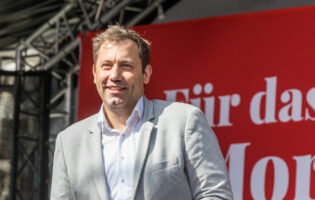Don’t Mention the Four

Dan Hough
University of Sussex
Dr. Dan Hough is a Professor of Politics at the University of Sussex in the UK. His research focuses on party politics, corruption and anti-corruption. In terms of German politics, he's written one single-authored book on the Party of Democratic Socialism (the Left Party's predecessor) and one co-authored (with Jonathan Olsen and Michael Koss) book on the Left Party.
“Football is not a matter of life or death,” claimed Bill Shankly, a former manager of Liverpool, one of England’s most well-known football clubs. “It’s much more important than that!” While most would agree that Shankly was over-egging the significance of what Pele once called “the beautiful game” ever so slightly, it’s been hard to ignore the prominence of the football World Cup in the media over the last month or so.
Germany has been as wrapped up in World Cup mania as everywhere else, and the national flags that were so prominent on car roofs and mirrors during the 2006 tournament (that Germany hosted) have once again reappeared. And in a purely football sense, with very good reason: Germany has a young, vibrant and capable side. The average age of the team is twenty-three and the vitality with which they play has given the tournament a zest and energy that has been noticeable by its absence elsewhere (the decidedly depressing Brazilians included!). Indeed, the German team’s emphatic 4-0 hammering of much-fancied Argentina in the quarterfinals on Saturday 3 July will ensure that the flags remain very much in evidence for a few more days yet.
But while football fans around the world debate the merits of Mesut Özil’s rapid rise to prominence or Bastian Schweinsteiger’s transformation into a holding midfield player, there is, of course, sometimes a more negative dynamic that can be unleashed at such times; avidly supporting a national football team is one thing, but there will always be some who find the temptation to drum up support by resorting to tiresome national stereotypes just too great to resist. With this in mind one game caught the eye immediately: The clash between England and Germany in Bloemfontein on 27 June.
When the two sides have met in the past, parts of the British press appear to have been compelled to harp on about previous wars between the countries. The most famous example of this came in 1996 when the tabloid Daily Mirror mocked up a picture of Stuart Pearce, a then England player, wearing a Tommy helmet and apparently heading towards Berlin while shouting ‘Achtung, surrender!’ While few expected the likes of the Mirror to reach such heights again, the omens still did not look particularly good when the day after England defeated Slovenia to set up the knockout tie with Germany the Daily Star claimed “Job done, now for the Hun!” Indeed, the Star has an impressive track record in terms of, at best, bad taste and at worst downright xenophobic slights on Germany; accusations that the German team’s playing kit had subliminal similarities with an SS uniform (28 January 2010) being one of the most recent in a long line of nonsensical stories.
And yet the Star’s style and rhetoric have remained very much the exception rather than the rule this time around. England versus Germany games are great occasions, and such occasions do still prompt great emotions. Yet, the pre-match spin centered almost exclusively on football-related issues, whether they be Germany’s overriding success in the penalty shoot outs that act as tie-breakers when the scores are level in knock out games or in England’s apparent ‘kick and rush’ (i.e. old fashioned and unsophisticated) style of play. The venom of previous years was curiously lacking, with even the Daily Mail’s Richard Littlejohn – normally a safe bet for a bit of rabble-rousing – claiming that it was about time “to bury the tiresome two world wars and one world cup thing for good.” This also remained the case after the game (which Germany won at a canter, 4-1) even though England clearly had a perfectly good goal erroneously wiped out. The focus remained on the excellent performance of the German side, the abject showing of the England team, and why on earth the England manager, Fabio Capello, was earning £6 million a year. Any answers you may have to that last question can be emailed to the author of this piece at the email address below by the way…
Does this apparent sea-change mean that using war-like imagery is now all rather passé? Well, no, not quite. “This World Cup is just like WWII” claimed one well-respected (English) football blogger in the run up to the game: “The French have given up and gone home early, the Americans only got in to the second round at the very last minute and we are once again left to fight the Germans!” Sky News, meanwhile, claimed “Don’t mention the four” (as opposed to the phrase “Don’t mention the War” that John Cleese made famous in the British sitcom Fawlty Towers) just minutes after the game had finished. These lines may well not be at the cutting edge of comedy, but they are a lot less nasty than many that have appeared in previous years. Indeed, the world would be a much poorer place if national stereotyping was seen as an unadulterated bad thing, and, as Die Welt’s Thomas Kielinger noted in the immediate aftermath of the game, these stereotypes are the very subtext of much of our international communication – and they can also help conjure up no end of (at least half-) decent one-liners too.
So while the 2010 World Cup has seen a rather refreshing scaling down of some of the more extreme rhetoric, don’t expect history to vanish completely from discourse on Anglo-German relations. And, well, perhaps – providing it comes out in the right way – that shouldn’t be seen as such a bad thing either.









